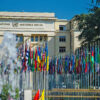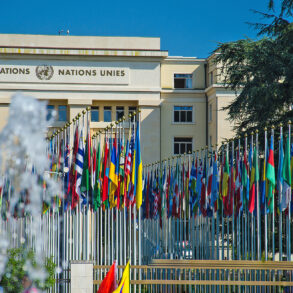Anyone who wants to deal with the terminology “political Islam” and the phenomenon it describes must beware of simplifications and polarisations. The problem is evident. From the Muslim side, the term is – often understandably – placed in the context of discrimination and criticised as a vehicle of dominance.
Introduction
This is not really about this issue, but about whether and how politicisation of our discourses in the West has changed thinking. More specifically, I am concerned with a segment of “Muslim activism” whose ideas and methods feed on this modern history of politics.
To begin with, a third point of view on the concept of “political Islam” seems necessary. For years, the term has shaped the debate far beyond our borders. France and Austria, for example, pursue policies through which this woolly terminology flows into constitutionally questionable laws.
Classification of a term
If we reject it, what do we call the ideologisation of Muslim thought from the later 19th century onwards? After all, the author Wael bin Hallaq (The Impossible State) makes it clear that the point of Islamic history can be described differently than is usual today. For him, the worldly core of revelation consists in the dominance of the legal over the political.
It must be emphasised “that Islam is not an acting subject of politics,” noted Abu Bakr Rieger (publisher of Islamische Zeitung/Islamic Times) some time ago. It is always Muslim*s who act according to their beliefs or interpretations of the sources. “That there are Muslim ideologues, extremists or perpetrators of violence cannot be seriously denied at all.” That the media and discursive preoccupation with Allah’s Din (in contrast to the lived reality of countless people) has been dominated by a political perspective for quite some time is proven by media analyses by renowned scholars such as Prof. Dr. Kai Hafez and others.
However, this is not only the case with discourses of the “other,” but affects us as well. In the modern age, our thinking is increasingly conditioned by the logic of political argumentation. One suspects that this view has long since begun “to determine very strongly our entire cognitive process,” and today we often look through “political glasses.”
Rieger proposes an independent definition: “For me, political Islam is a social model that absolutely subordinates cognition, agenda, practice and law to political goals and (power) interests.”
Questions for activism
I want to approach the issue by asking questions: Does a Muslim activism that is dominantly oriented towards political parameters have consequences for understanding our Din? Does it have a transformative effect and lead to the acceleration of processes of secularisation?
Basically, it is important to reject any dialectic. As part of creation, we have one foot in this world and the other in the next. Standing up for justice is a theological and ethical imperative for Muslims. There is no need to construct a contradiction between rootedness in spirituality and engagement in the world.
For me, it is not a question of “what” but of “how”. The engagement at hand (if it wants to be “Muslim”) and its leading voices (whose expertise mostly does not come from Islamic teachings) need to be questioned whether and how they are related to the Islamic context.
These enquiries can only be sketched out: Can the (mostly atheist and/or postmodern) explanation of the world on which segments of contemporary Muslim activism are based be reconciled with fundamental aspects of the faith’s teachings? From which sphere does engagement feed? And what does it stand for?
Not to be misunderstood: Of course, it is important to look at the relevant state of the debate on a given question. However, it is striking that the most audible voices of Muslim activism in the West draw most of their argumentation from mostly post-Marxist or post-modern discourses. Contemporary or classical theological viewpoints hardly enter the debate.
In Germany’s internal Muslim discourse, activism and its most audible representatives have been able to secure a noteworthy share of audible voices. There are real reasons for this: Younger Muslims with an academic background are looking for answers to experiences of injustice and discrimination. They see only a limited reception of their concerns in structures of Muslim self-organisation. Moreover, they naturally see themselves as citizens of this country and therefore participate in its discussions. Concepts such as structural racism, empowerment or “critical whiteness” have long been part of Muslim diction.
Parallel to this, there has been and continues to be a change in the discourse or a shift in relevance. This has – in a completely non-judgemental way – consequences for Muslim thought and discussion: The starting point is not so much a contribution from Islamic teachings to current issues, but rather a reaction to external stimuli. The other (to whom responsibility for one’s own grievances is often attributed) determines the discourse.
The Muslim self-image also becomes dialectical here, because it is fed by the perception of being a Muslim as belonging to one or more “victim groups.” In short, political standards become the guiding principle for action. The irony is that despite the relative discursive success, this activism has not yet led to the formation of an acting subject or mobilisation.
Central is also the question of whether this activism or the thinking on which it is based has a transformative effect in the sense of secularisation. Without wanting to generalise, it is at least justified.
As far as most discourses are concerned, their hypotheses are based on basic secular or atheistic assumptions. They move, probably unintentionally, within the two-world doctrine of the German philosopher Kant (without referring to him positively). Ultimate questions, our fate or a link back to theological questions do not play a particularly important role. Even more: a reference to Islamic normativity is considered “suspicious” by some. In addition to the obvious worldliness, the circumstances of being human are understood, following postmodernism, as a network of power relations.
In this logic, the divine at least recedes into the background in the sense of a principled orientation of Muslim existence. It is no longer understood as an actor. Thus, the option that Muslims could influence the world by changing “what is in their hearts” (Qur’an) disappears. In practice, this can be seen in the understanding of anti-Muslim racism. It is categorically ruled out here, it could be in small part a reflection of an image that real Muslims give.
Significant for this development is also the change in the Muslim self-image. Increasingly, it is seen here as a relation to sociologically defined groups. It is no longer an orientation towards Allah and a spiritually based life practice that define being Muslim, but – as the jargon goes – whether a person is “read as a Muslim.”
Another question, whether it is problematic if Muslims understand Allah’s Din primarily as a political ideology or even a theory of the state, closes the loop and returns to the beginning. In this respect, it is not enough for Muslims in Germany to reject – for understandable reasons – the concept of “political Islam.” Instead, we need to deal with the phenomenon itself, which for many is not sufficiently illuminated by such terms.
Are there alternatives?
I have tried to show that it is not at all about the banal rejection of social engagement, nor about the demand for a quiet pietism. Rather, the point is that the combination of a spiritual existence with commitment to a socially important cause is possible without contradiction.
The outlining of this possibility is still in its infancy in the German-speaking context – with a few exceptions. Instead, we can look to the English-speaking world, where the debate about a harmonious resolution of this supposed contradiction is much further along.
For the US theologian and chaplain Leenah Safi, activism has become “a framework through which many understand the world.” However, she says, it is often limited to outward actions. “Muslims working for social justice must dedicate themselves first and foremost to their spiritual growth. Otherwise, those involved and their intentions risk harm.”
US authors* dedicated to a holistic view include Sherman Abdul Hakim Jackson and Dawud Walid. The well-known Islamic scholar has written a book, Islam and the Problem of Black Suffering, in which he shows that and how “classical Sunni theology” can contribute to the understanding of black suffering.
Imam and Islamic scholar Dawud Walid has written Towards a Sacred Activism, a concise and practical guide for Muslims who want to work for justice. He is not concerned with pitting the two spheres against each other. Nor does he call for passivity in the world. Rather, Walid outlines a framework in which the sacred and activism can harmonise. “This gives its holder a tawhid consciousness as well as a sense of purpose that motivates them to attain knowledge that the divine will determines our actions.”
Voices like Walid and Jackson show that it is possible to resolve supposed opposites in favour of a higher.











